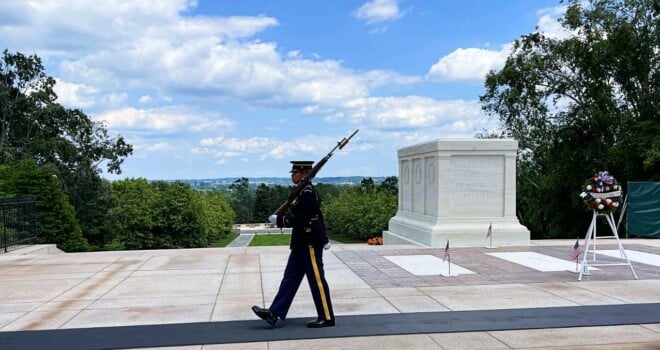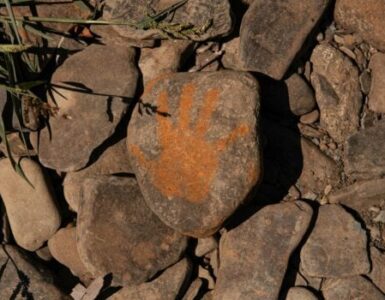On November 11, 1918, the disaster for Western Civilization known as World War I ended. An armistice was signed at the 11th hour on the 11th day of the 11th month. After the war, the United States, following the lead of France and England, laid to rest the remains of an American soldier—his name “known but to God”—on a hillside in Virginia overlooking Washington DC.
November 11th is now Veteran’s Day, a day we honor all military veterans, dead and alive. And that hillside overlooking DC is called Arlington National Cemetery. It features the Tomb of the Unknown Soldier, symbolizing honor and reverence for soldiers who gave their lives for their country.
Guards stand watch at the Tomb of the Unknown Soldier twenty-four hours a day, seven days a week. Rain, shine, heat, cold—it doesn’t matter, someone is always there guarding the tomb. And that someone guards it with his life. Why? Because he is a true believer. That guard understands that a soldier never dies—until he is forgotten.
A few years back, a scholar offered some insight on the changing of the guard at Arlington. He wrote that man “has an inborn need and hunger for ceremony—richly textured, beauty-laden ceremonies, fragrant with mystery and symbolism.” There is in human beings, he wrote, “an anthropological longing for pageantry to express our highest aspirations.” The scholar then noted that there was a remarkable similarity between the changing of the guard ceremony and reverently celebrated liturgical rites, such as the Holy Sacrifice of Mass.
The rite at Arlington begins with the chiming of a bell as an impeccably dressed commanding officer processes in a perfectly ordered pace onto the plaza that houses the tomb. The plaza itself is enclosed. Visitors remain outside its boundaries. The plaza is the soldiers’ realm, just as at Holy Mass the sanctuary is the realm of the priest, who enters wearing sacred vestments which should “mold the demeanor of the celebrant and indeed all those present.”
When the commanding officer reaches the center of the plaza in front of the tomb, he makes a sharp right angle turn toward the tomb and slowly salutes it. This gesture of reverence, repeated three times, mirrors the more exulted genuflection a priest gives when entering the sanctuary, before he kisses the altar, which traditionally was stone or marble and resembled not a table, but a tomb.
In a series of strange and precisely ordered movements, the commanding officer inspects the new guard’s person, uniform, and rifle—a brilliant-looking weapon with a highly polished wooden stock. The inspection is part of a changeover that takes around nine minutes from start to finish.
To an indifferent viewer the commander’s complex gestures might seem absurdly irrational and senseless. Yet what is almost as remarkable as the ceremony itself is the reaction of the spectators, which includes a large contingent of teenagers. Far from finding the enigmatic gestures of the rite meaningless and absurd, the spectators look on seriously, intently, seeming to understand what is being expressed without words, what is being expressed by the very silence itself.
For there is something in the ceremony that commands respect. The spectators have no need to enter the inner sanctum of the plaza to participate in this rite in the same manner as the soldiers do; their active and full participation is written on their faces. (James Monti)
Punch in “Arlington changing of the guard,” and you can watch the ceremony on your device. At the beginning, the sergeant informs the crowd in a very forceful tone that due to the solemn nature of the ritual all those present are to remain silent. And as the scholar noted, it’s interesting to watch the faces in the crowd. Young people, who a few moments earlier were probably bored and wondering what was for lunch, have snapped to attention. They look on intently, understanding that something serious is taking place.
The day before his shift, a guard spends six hours preparing his heavy wool uniform, shining his shoes, and cleaning his rifle. He gets his hair cut. This should get us thinking: What if the guard entered the plaza dressed not in his spotless uniform, specialized hat, and carrying his rifle, but in his street clothes, so that he looked no different than the tourists and bystanders?
What if instead of sternly announcing to the people to be quiet, he smiled in a welcoming manner while making eye contact with everyone? What if he even told them to turn and greet their neighbor, or he walked around the plaza asking if it was anybody’s birthday or anniversary? What kind of impression do you think that would have left on people? They’d most likely have left Arlington thinking that the guard was a nice entertaining guy, out to build community and make people feel good about themselves.
Of course, that never happens. Instead, people leave Arlington Cemetery understanding that the guard was there for no other reason than to guard the tomb—with his life. They walk away thinking to themselves, “That guard is a true believer. He doesn’t care what the world thinks.”
What kind of impression do you get when you attend Holy Mass? What kind of impression do you give off? What does the priest’s appearance and tone say to you? What do his long robes say? Do they say he is a man who exults himself and rips off widows? Or do they say that he is a true believer who doesn’t care what the world thinks?
What about you? Are you a true believer?
Consider:
Christ did not enter into a sanctuary made by hands, a copy of the true one, but heaven itself, that he might now appear before God on our behalf.
The key word in there is now: “…that he might now appear before God on our behalf.” St Paul understood that Christ’s one sacrifice for sins was eternal. It was a once for all event, but not a one-day event. It was offered once to take away the sins of many, but it was still happening. And it is still happening.
The jar of flour shall not go empty, nor the jug of oil run dry, until the day when the LORD sends rain upon the earth.
That pronouncement from Elijah was about Christ’s eternal sacrifice. It is about Holy Mass.
And so, an unknown soldier died for his country. He’s honored and buried in a guarded tomb. And it is right and just that people go do him honor—for he represents all the brave soldiers that gave their lives for others. Jesus Christ, a known soldier, gave His life, not just to save a country, but the whole world. The God-Man dies, so that you might live. What could be more sacred, solemn, and mysterious than that?
Christ shed every drop of His blood. Like the poor widow, He contributed all He had, His whole livelihood on Calvary. What about you then? Will you contribute your whole life, or hold back and just give from your surplus wealth?
My friends, come to attention and look intently. For something serious is taking place—now. Pick up your brilliant weapon with the wooden stock, your cross. And carry it every day, rain or shine, heat or cold. Stand watch over your soul and guard it with your life. Be a true believer. And when the time for your changeover comes, your Captain and your King will inspect you, and then He’ll say, “Well done.”
Photo from Middle Journey














